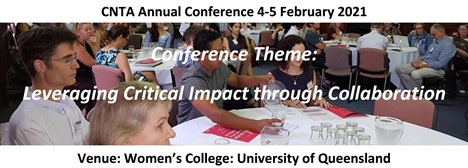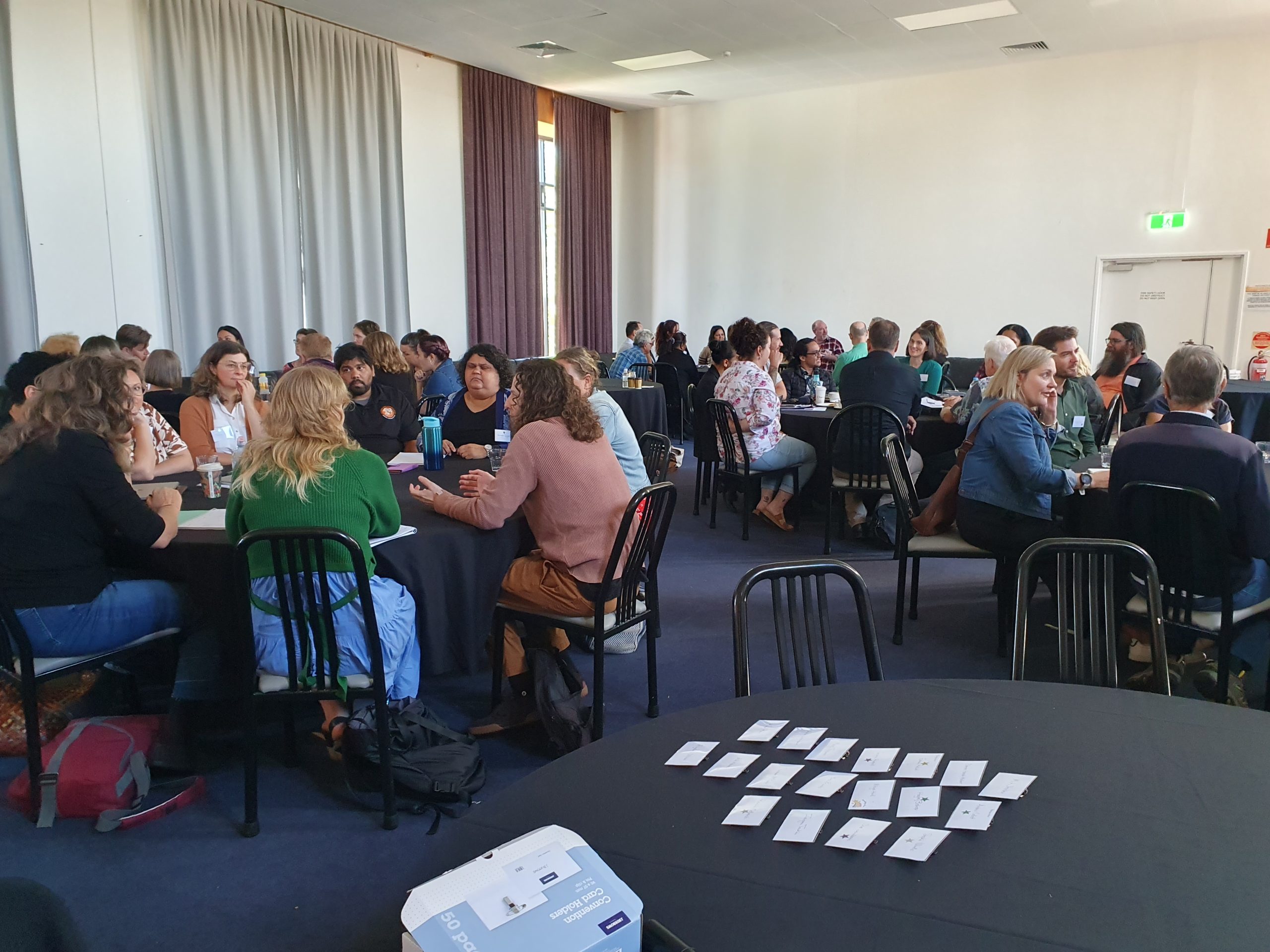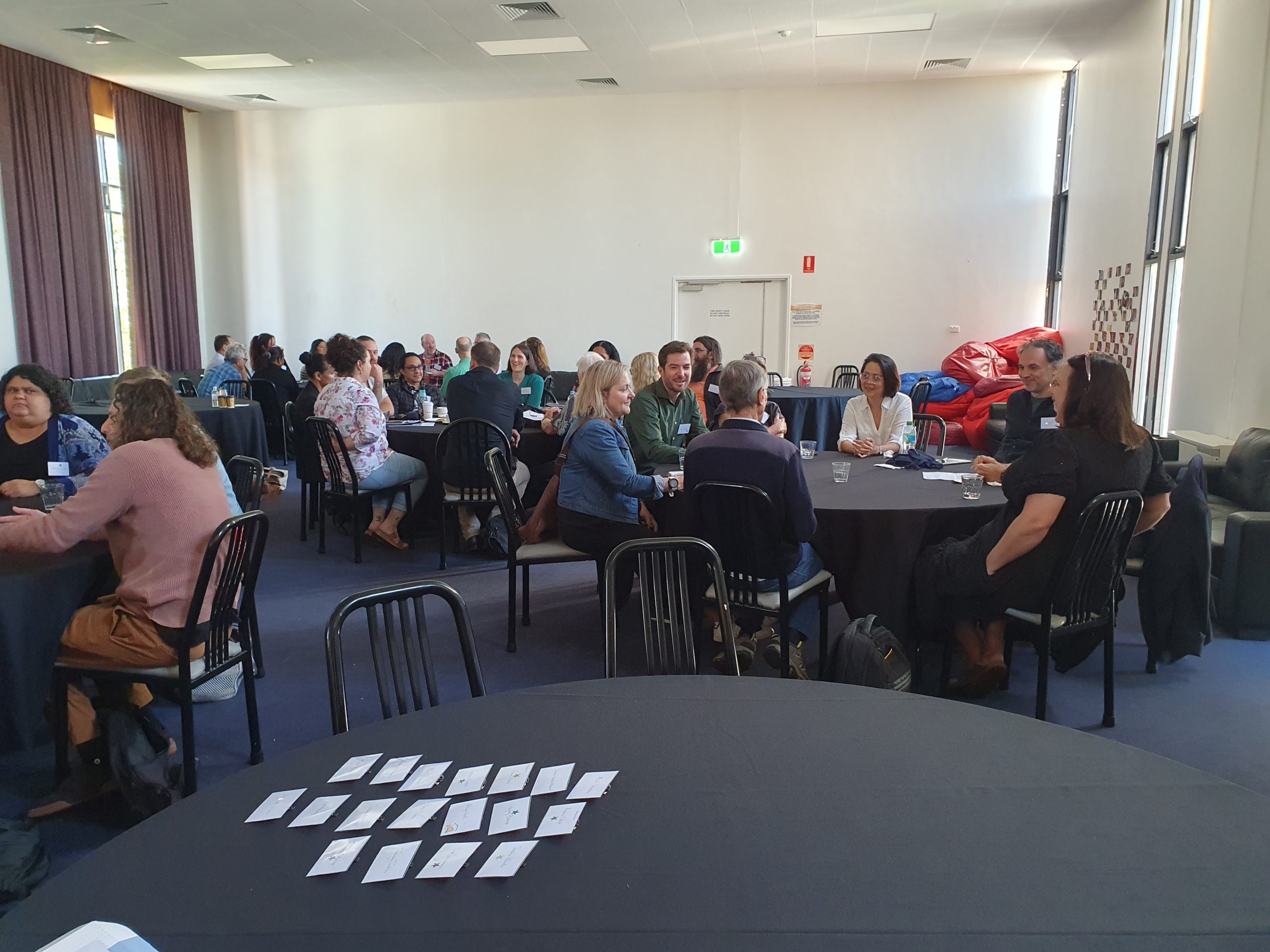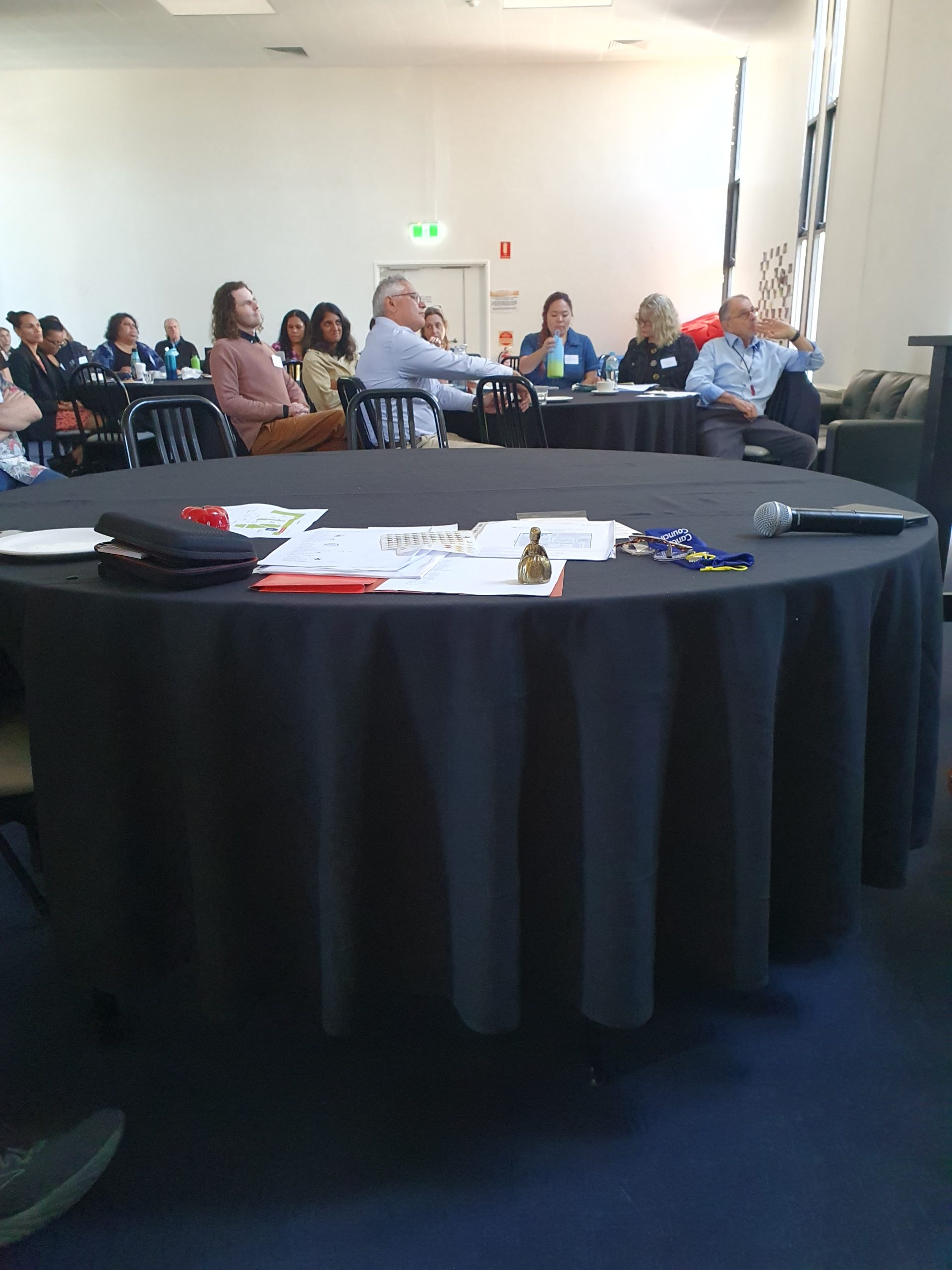Annual Conference 2025
Read More about CNTA Annual Conference Program 2025
From whence we came to where we go: Anthropology in the native title era
CNTA 2025 – David Trigger Intro
CNTA 2025 – David Trigger
CNTA 2025 – Lee Sackett Key Note
CNTA 2025 – Nicola Colbran
CNTA 2025 – Emma King & Amy Usher
CNTA 2025 – Kevin Smith
CNTA 2025 – Julie Finlayson
CNTA 2025 – Michael Lucas
CNTA 2025 – Carmen Cooms-Delaney & Diane Smith
CNTA 2025 – Petronella Vaarzon-Morel
CNTA 2025 – Eddie McDonald
Annual Conference 2024
Read More about CNTA Annual Conference Program 2024
CNTA 2024 – Kevin Smith
The Opening Address for the CNTA Annual Conference
CNTA 2024 – Julie Finlayson
CNTA 2024 – Kevin Murphy
CNTA 2024 – Richard Martin
CNTA 2024 – Yvette Bradley
CNTA 2024 – Wendy Asche & Amy Usher
CNTA 2024 – Emma Kowal
CNTA 2024 – Erica, Andrew and David
CNTA 2024 – Francesa Merlan
CNTA 2024 – Innes & Vaarzon-Morel
COMMUNITY DEVELOPMENT UNIT: The highs and lows of collaboration
“For the CLC community development is a way of working that involves a set of principles and processes that build self-reliance and strengthen communities through the achievement of specific community objectives.Community development objectives may range from improving health and education to the establishment of a community enterprise.”
Community Development Unit Program Goal
Aboriginal people are controlling the development of our communities, homelands and building a strong future for everyone.
Objectives
- To increase Aboriginal engagement, ownership and control over the development of our communities, homelands and futures.
- To deliver development outcomes that are prioritised and valued by Aboriginal people, and that make a meaningful and sustained difference in our lives, communities, homelands and futures.
Native title compensation research: fieldwork and reporting practicalities
Definitional: Cultural Loss
Richard Martin (2023, p. 633) notes that in 2019 the High Court amended the decision to replace payment in solatium with money for “cultural loss,” which was construed by the court as compensable damage inflicted by another on the cultural value of native title. Martin notes that, in this legal usage, “compensation” is not an award to cover distress caused by extinguishment but is rather a valuation of the damage to “culture.”
In other words, in a native title compensation framework, “cultural loss” refers to the potential loss or damage to elements of traditional law and custom held by a group brought about via a specific act or series of events (which have been deemed to be compensable). As Martin explores (and will discuss further tomorrow), this legal interpretation is somewhat different to existing anthropological understandings relating to cultural loss and culture change through time.
Definitional: Compensable Acts and Effects
Northern Territory vs Griffiths [2019] describes 53 compensable acts in relation to various grants of tenure over land parcels within the town of Timber Creek, which were later held to have impaired or extinguished the Ngaliwurru and Nungali Peoples native title rights in those areas. The compensable acts were listed as occurring at the date of the granting of the tenure for each parcel (variously between 1980-1996).
Of note however, the High Court noted that there were “four events … which were not the direct result of compensable acts” but which were effects of those acts after the granting of the tenure. The Judge said that these events helped to explain why the “compensable act itself has a compensable effect which is not one dimensional”, leading the Judge to conclude that “the consequences of [compensable] acts can be incremental and cumulative”.
Notes from Paul Burke: The legal doctrine
I consider the following aspects of the legal doctrine to be relatively clear (paragraph numbers refer to High Court’s decision in Griffiths):
- The acceptance of a broad distinction between economic and non-economic loss (or cultural loss) when considering just terms compensation under section 51(1) of the Native Title Act for the ‘loss, diminution, impairment or other effect of the act on their native title rights and interests’.
- Economic loss is to be calculated by the usual valuation methods for the valuation of land at the time of the extinguishment/impairment (plus simple interest between that date and the date of the court judgement). In general terms, the procedure for assessing cultural loss is threefold:
- identification of the compensable acts (typically the granting of freehold interests or leases or public works such as roads);
- identification of the native title holders’ connection with the land or waters by their laws and customs; and
- consideration of the particular and inter-related effects of the compensable acts on that connection. (Para. 218) Because traditional ‘connection’ is spiritual/religious in nature, its loss or diminution
Expected Challenges: Towns and Disrupted Connections
Presentation to: Centre for Native Title Anthropology
Annual Conference February 7-9 2024, Adelaide
Francesca Merlan
Introduction
My talk is not about `unexpected’ challenges, but more about expected ones. I assert that towns are places of especial challenge for claims of connection unless circumstances have mitigated the challenge; diminished connection is to be expected rather than unexpected. Where connection has been disrupted, it is more difficult for native title processes to unfold consensually. Disrupted connection is a driver of contention.
I have done most of my longest-term research around a town in the northern Territory, Katherine. This has informed my opening question: where are native title (and generally matters of connection) more consensual; and where are they more conflicted. I will compare and contrast several examples of town situations and somewhat different outcomes.
I emphasize that my examples come from the far north, and from colonial intrusion that first occurred in a particular time period. It remains to consider the situation of towns more broadly.
Finally, for our discussion,and I need your help! what are the practical implications of disrupted connection? What kinds of socio-historical processes drive disrupted connection; and can the differences be managed, mediated?I make a few suggestions, some cautionary.
Ciarra Vu and Sheree Sharma
A better approach:
- Understanding the groups’ traditional law and custom with regards.
- Land holding: patriclans to particular areas of association. This will inform rules around native title decision making.
- Membership to the land holding group; this will inform the way in which membership applications are assessed by directors.
- Representation: Elders? Consensus? This will inform rules around board representation.
- Understanding the history of the group. Has removal history created tensions amongst family groups. This will inform what steps the group wishes to take to deal with these tensions before the PBC is established.
- Working with the whole group to develop, workshop and assess options that reflect the groups’ way of “doing business”. Generally done over a series of workshops well before the likely CD date.
- Increasing interactive participation into the workshops with the claim group.
- This knowledge and expertise goes beyond the skill set of a lawyer. Better outcomes are achieved when those with the right skills are involved.
Let’s Talk:Unexpected Challenges in the Native Title Landscape
Presentation to: Centre for Native Title Anthropology
Annual Conference 2024, Adelaide
Catherine Wohlan, Anthropologist
Introduction
After a stormy native title meeting, a few years ago now, at the front of the local store, opposite my family home that I had lived in for almost 20 years, a senior Aboriginal man gave me a good telling off. He said, ‘You have your degree, I have my law but what have these young people got? they’ve got nothing’. By way of background I’ll add that I had done fieldwork with him over several years, had got to know his life story and spent time with his family. The information he provided had helped to progress a successful native title determination. For me, the time we’d spent together had engendered a certain respect.
We both felt a sense of angst about conflict at the recent native title meeting. For me this was a sense of sadness about the arguments that ricocheted out of the meeting and into everyday life. His angst wasn’t fully articulated in his challenges to me. For him meetings were inevitably adversarial. I felt he was asking that, as an anthropologist, what was I doing to get things happening in a way that would make a real difference? What had I done for the young people? I was made to feel that I needed to do more; to do better.
Gallery
Annual Conference 2022
CNTA’s 2022 Annual Conference was held over 3 days from 9-11 February 2022. In light of Omicron events including border restrictions, CNTA proceeded with a Zoom-only conference.
The presentations in each session were developed at the initiative of Native Title Representative Bodies and Service Providers. A conference program can be downloaded from this site.
For the first time and in response to restrictions imposed by Covid factors such as closed borders and restrictions on staff travel, CNTA hosted a Webinar with technical support from the ANU College of the Arts and Social Sciences (CASS). CNTA is most appreciative of the support CASS provided, which enabled the login and recording processes across multiple time zones.
Take-up of the online options was very encouraging, with 174 registering for the event and individual logins to sessions over the three days varying between 60 and 90. Anthropologists from Native Title Representative Bodies, Service Providers and Land Councils, as well as consultant anthropologists, lawyers and community development practitioners were involved, either giving presentations, chairing, or acting as chat moderators in sessions.
For technical reasons the conference sessions each had a separate access link with all sessions over the three days recorded. The edited Videocasts are available below. Additionally, apart from these, brief accompanying notes of individual presentations are downloadable for all sessions on Days 2 and 3.
Day 1
Session 1
Welcome to the Workshop; Prof Ian Anderson AO, Deputy Vice Chancellor (Student and University Experience), Australian National University.
Professor Anderson is a Palawa man from Tasmania. He has an extensive work history in Indigenous health as a health worker, education and general practitioner. Before taking up his position at the ANU, he held executive roles in various Commonwealth Government departments.
Keynote address; Prof David Trigger, co-Director of CNTA: Protection and management of the Indigenous estate: the role of professional independence in anthropological studies of native title and cultural heritage
Session 2
Tegen Scott: The ‘I’ in Free Prior and Informed Consent (FPIC): Using technology to inform consultations
Session 3
Gareth Lewis (consultant): Measuring Damage and Loss in Aboriginal Australia: a comparative approach to sacred site damage issues as indicators of loss in Native Title compensation matters
Session 4
Panel session: The role of anthropologists engaged by resource companies in WA
Daniel Bruckner (Integritat): Anthropology and the resources sector in the post Juukan aera and proposed legislative changes
Dirima Cuthbert: Social Surroundings Assessments in Western Australia’s Pilbara Region
Corey Herrmann and Amy Usher (YMAC). A Critical reflection on the role (or not!) of an anthropologist in Social Surroundings – traps for new players
Day 2
Session 1
Joe Firinu (NLC), David Trigger (CNTA co-Director) & Susan Donaldson (consultant) in conversation:
Joe Firinu & David Trigger: Sands of time – The tension between claim research and contemporary claimants, particularly in relation to conceptualizations of Land Tenure and decision making
Sue Donaldson (consultant): Interpretative Reports: what did the old people say, what we say – Preparing Interpretive Reports for PBCs which feed into a broader process of engagement around decision making.
Notes on this session can be downloaded from this site
Session 2
Sam Williams (NLC): Issues around succession and decision-making for applied anthropologists. A pre-recorded video introduction by Sam
Panel Discussion: Gareth Lewis (consultant), Emma King (NLC)
Notes on this session can be downloaded from this site
Session 3
John Morton (consultant): What is ‘The Indigenous Estate’?
Notes on this session can be downloaded from this site
Session 4
Kevin Murphy (CYLC): At the intersection of the legal definition of native title rights holder and the practice of authority to exercise rights
Panel Discussants: Luis Lopez (NQLC) and Tony Redmond (consultant)
Notes on this session can be downloaded from this site
Day 3
Session 1
Richard Martin (UQ): Rights and their exercise: On the State’s attempt to restrict the right to access and take resource for any purpose in the Kurtjar people’s native title claim
Notes on this session can be downloaded from this site
Session 2
Peter Murray & Damian Hastings-James (KLC): How useful are native title materials in managing the Indigenous estate?
Notes on this session can be downloaded from this site
Session 3
Courtney Boag (FNLRS): The language of compensation research in south-eastern Australia
Panel Discussion: Wendy Asche (consultant), John Morton (consultant), & Sturt Glacken (QC)
Notes on this session can be downloaded from this site
Session 4
Queensland South and CLC Community development: Fit for Purpose: Community Development models
Ian Sweeney (CLC CD): Community Development Work at the CLC
Felicity Thiessen, Carmen Cooms-Delaney and Joyce Gehir (QSNTS): People, Place and Partnership (PPP) – A model for leveraging and governing native title
Notes on this session can be downloaded from this site
Session 5
Panel Session: Louise Allwood, Pascale Taplin (NQLC) & David Martin (consultant): Mentorship in representative bodies – New opportunities for Professional Development?
Notes on this session can be downloaded from this site
Annual Conference 2021

The theme of this conference focuses on the advantages that collaborations and partnerships potentially offer. Working with a partnership through networked institutional or organisational arrangements, even between individuals, can result in increased impact. The conference theme explores the challenges of this form of working, before highlighting opportunities and the work ahead. The conference program can be downloaded from this site. CNTA has uploaded podcasts and select video casts of presentations from this workshop; links are below.
Day 1: The challenges
Opening address: Nic Peterson: Collaboration and Native Title
Downloadable text, Nic Peterson on collaboration in Native Title
Keynote Address: Justice Debbie Mortimer: Re-evaluating the role of expert reports in Native Title proceedings
In this thought-provoking and challenging presentation, Justice Mortimer speaks of the need for a creative, collaborative approach to achieving better outcomes with expert reports, outlining how this might be realised, in the context of existing experience in Federal Court Native Title proceedings.
She outlines options which might alleviate and overcome current barriers and entrenched assumptions which stymie timely and efficient Native Title outcomes, most particularly for the Indigenous groups concerned. She suggests that before compensation claims become common, a reset in approaches to experts’ reports is crucia l- inboth contested and consented determinations, and compensation claims.
Justice Mortimer’s address is provocative and challenges much received practice, for anthropologists and the lawyers who brief them alike.
It is available below both as a podcast sound file and a Youtube video, and also as a downloadable pdf file.
Podcast
Videocast
Downloadable text of Justice Mortimer’s presentation
A further instance of Justice Mortimer’s reasoning which is of considerable significance to Native Title anthropologists, can be found in her joint judgment with Justice Colvin in Drury on behalf of the Nanda People vs State of Western Australia, [2020] FCAFC 69.
Of particular relevance in the Judgment of Mortimer and Colvin JJ is their consideration of The nature of native title from [13]. This includes:
- At [14], clarifying that the statutory definition of native title in s 223 of the NTA reflects that “native title rights and interests have a physical or material aspect (the right to do something in relation to land and waters) and a cultural or spiritual aspect (the connection with the land or waters)”;
- At [16], state that native title rights and interests may “reflect a different conception of property’ or ‘belonging’ to those familiar to the common law (that is, involve a translation into concepts cognizable to the common law; see also de Rose quoted at [23]);
- At [17], state that there will usually be “a necessary and direct connection” between the extent of the common physical and spiritual connection under the laws acknowledged and customs observed on the one hand, and the extent of the native title.
- At [21], differentiate in legal terms between what anthropologists typically term clan-estate systems of law and custom from those found in ‘arid or semi-arid’ areas, and observe that the laws and customs from which native titles derive must necessarily be those of a society or group;
- At [23], set out the legal distinction between ‘communal’, ‘group’ and individual’ native titles as set out in de Rose;
- At [24]-[34], the Justices set out their reasoning regarding the legal concept of society, concluding that (depending on the facts) they accept that there is the possibility of separate societies, each with their own laws and customs which are the source of their separate connections to the same land. This is then expanded on in the section Overlapping native title from [35]-[37].
This latter will likely be the subject of lively discussion amongst native title anthropologists.
Downloadable copy of the Drury decision
Kevin Keeffe: Making things, right? Case studies in collaboration and conflict since the Mabo decision
In 1993, after the High Court Mabo decision, and before the Native Title Act was legislated, the Council for Aboriginal Reconciliation produced a policy guidance booklet called: Making Things Right: Reconciliation After the High Court’s Decision on Native Title. This paper reviews case studies in both conflict and collaboration in the native title landscape since that time and points to potential lessons for native title practice today.
Downloadable Kevin Keeffe presentation slides
Panel and Q&A: What are the opportunities for cross-institutional collaboration in native title?
Presentations by Chris Fewings, Registrar of the National Native Title Tribunal; Ophelia Rubinich Assistant Director for the Return of Cultural Heritage with the Australian Institute of Aboriginal and Torres Strait Islander Studies; and David Allinson, Manager, Social and Indigenous Policy, Queensland Resources Council, followed by a question and answer session.
Day 2: NT compensation: achieving impact
Kevin Smith: The relevance, role, and response of native title to an expanding Indigenous Affairs landscape
In 2021, Traditional Owners will have to juggle the new era of compensation, complex legislative changes introduced by the Native Title Legislation Amendment Bill 2019, new regulatory requirements under the CATSI Act as well as the response to the Juukan Gorge Inquiry, Closing the Gap Agreement and Voice to Government agenda.
David Trigger: Issues and challenges in compensation research
In relation to ‘cultural loss’, what is the connection to country arising from ‘traditional law & custom’? Who are the right people (= ‘native title holders’) with that connection? A legal assumption may be that these issues are clear, arising from a determination. But given the significance of now recognised ‘collateral detrimental effects’ [Timber Creek HC, para 200], the dimensions of ‘effect’ in cultural terms is an emerging research task.
Downloadable (revised) David Trigger presentation slides
Day 2: Looking to the future
David Evans: Governance Issues for Trusts
Indigenous Land Used Agreements (ILUAs) entered by Aboriginal corporations normally lead to the establishment of trusts to receive royalty payments on behalf of Community members. These trusts can be complex in nature and are generally established with significant and onerous compliance requirements. Having sat on several Indigenous boards in the Pilbara WA as an independent director, David explores the issues and challenges for trust boards and prescribed body corporates (PBCs) in addressing the requirements contained in the trust deeds.
NTRB/NTSP Research Managers and anthropologists panel
Mia McCulloch: Getting up to speed for compensation claims
In this talk I begin with an overview of the context of compensation claims in Queensland since 2016 and the QSNTS approach to navigating this burgeoning area of native title work in the region. I finish by reflecting on some of the research focussed challenges to date as well as those I see to lay ahead, including the question of how to bring the wider in-house research cohort along with my own knowledge and capability developments in this area.
This involves three streams –
- relevant judgements
- reasoning and implications of these (legal)
- understanding tenure types and what to look for in the Queensland context (tenure).
These 3 streams will be discussed relative to;
- the context of Compensation in SEQ
- QSNTS’ approach to preparing for compensation claims in SEQ, including
challenges to date, and - Networking with rep bodies and other relevant organisations:
Pascale Taplin (NQLC):
Pascale explores some of the complexities that arise in native title research from the perspective of an in-house anthropologist. She reflects on her experiences in the field and the office to problematize our practice, and refocus on the relationships we form with claimants and informants.
Emma King (NLC – Nhulunbuy): The devolution of applied anthropology in representative bodies and land councils
I discuss how applied anthropology has been progressively devalued by the native title (and land rights) sectors over the past 20 years, and the factors responsible for its demise.
Using income flows from Aboriginal lands for wider ‘community’ benefit
Ian Sweeney: Working collaboratively in Aboriginal-led community benefit based on income streams from Aboriginal lands
As Aboriginal groups become land holders in receipt of income from mining agreements, lease payments, and other sources, the challenges of how to manage, invest and transform futures with the income streams have emerged. Over the past 15 years, the Central Land Council’s Community Development program has learned much from its deeply collaborative engagement with Aboriginal groups in negotiating the challenges to achieving sustainable social and economic outcomes.
See also the interviews of Ian Sweeney and four CLC Community Develop anthropologists on the ‘Podcasts’ page of this website.
__________________________________
Annual Conference 2020
The CNTA 2020 Annual conference was held at Queen’s College, the University of Melbourne, on 6-7 February. Our theme this year was “Culture and Native Title: Making the most of Emerging Opportunities.”
As in previous years, CNTA placed a high value on opportunities for small group discussion of key issues in the practice of native title anthropology. For the first time, CNTA in 2020 was able to record presentations and to provide the matching power point. However, in some cases an audio recording was not made but a text or Powerpoint of the presentation is available.
Cameo Dalley: Women In Native Title
Dalley Presentation Women In Native Title.Pdf
Nic Peterson: Culture and Native Title
Peterson Culture And Native Title.Pdf
David Martin: Culture and the High Court in the ASIC vs Kobelt case
David Martin Presentation Culture And The Courts.Pdf
Di Smith: Anthropology’s Law – culture and native title compensation
Di Smith Presentation Compensation.Pdf
Sue Meaghan (DPC): Cultural Loss; issues for negotiation of compensation settlement
Sue Meaghan Dpc Cnta Conference – Cultural Loss.Pdf
Mini Panel session
Bruce Martin (ILSC): Land & Water: Aspiration & Opportunity
Bruce Martin Presentation llsc.Pdf
Kevin Smith: Native Title Compensation: NNTC Proposed Resolution Framework
Kevin Keeffe: Redrawing the Regions: Opportunities and Challenges in the current policy landscape
Kevin Keefe Redrawing The Regions.Pdf
Susan Philips: Final Thoughts
David







